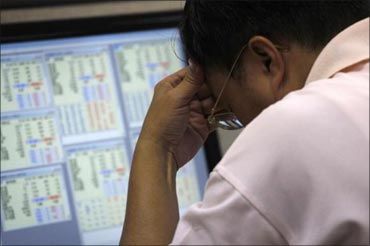 The BSE Sensex and Nifty fell more than 2 per cent on Tuesday, heading for their biggest daily loss since the midst of the rupee crisis in 2013 amid an unrelenting slide in oil prices and political uncertainty in Greece.
The BSE Sensex and Nifty fell more than 2 per cent on Tuesday, heading for their biggest daily loss since the midst of the rupee crisis in 2013 amid an unrelenting slide in oil prices and political uncertainty in Greece.
The minister of state for finance told The Economic Times that the government had no differences with the Reserve Bank of India on the need to fight inflation, sparking worries of potential delay in rate cuts as early as its next policy review in February.
The BSE Sensex fell as much as 2.3 per cent and the broader NSE index lost as much 2.2 per cent, heading for their biggest fall since Sept. 3, 2013, when the rupee was still reeling from its worst market turmoil since the 1991 balance of payment crisis.
"Markets are reading the slide in crude oil prices as a symptom of potential recession in the world economy. Some more fall will actually make India further attractive for investment," said G. Chokkalingam, founder of Equinomics, a research and fund advisory firm.
Earlier in the day, the Nifty January futures contract fell as much as 5 per cent to 8,000 points, which multiple dealers attributed to an unusual trade relative to where the contracts were trading at.
The quarterly earnings season kick-starting with Infosys' results on Jan. 9, the RBI's rate decision and the budget in February are seen as next key triggers.
Blue-chips led losses. ICICI Bank lost 3.3 per cent, while Infosys fell 1.8 per cent.
Oil explorers declined tracking the fall in U.S. crude oil below $50 per barrel. Reliance Industries fell 2.7 per cent, while Oil and Natural Gas Corp slumped 3.8 per cent.












 © 2025
© 2025